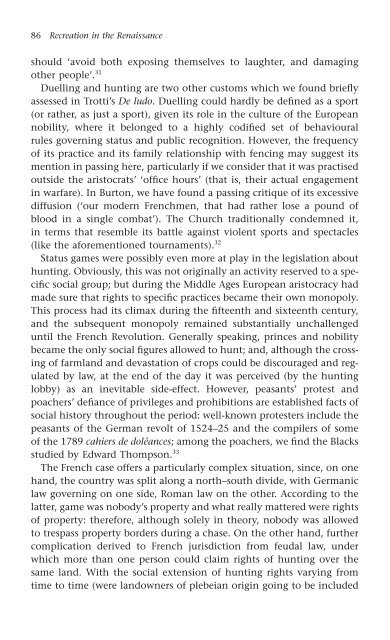Recreation in the Renaissance
Recreation in the Renaissance
Recreation in the Renaissance
- No tags were found...
You also want an ePaper? Increase the reach of your titles
YUMPU automatically turns print PDFs into web optimized ePapers that Google loves.
86 <strong>Recreation</strong> <strong>in</strong> <strong>the</strong> <strong>Renaissance</strong><br />
should ‘avoid both expos<strong>in</strong>g <strong>the</strong>mselves to laughter, and damag<strong>in</strong>g<br />
o<strong>the</strong>r people’. 31<br />
Duell<strong>in</strong>g and hunt<strong>in</strong>g are two o<strong>the</strong>r customs which we found briefly<br />
assessed <strong>in</strong> Trotti’s De ludo. Duell<strong>in</strong>g could hardly be def<strong>in</strong>ed as a sport<br />
(or ra<strong>the</strong>r, as just a sport), given its role <strong>in</strong> <strong>the</strong> culture of <strong>the</strong> European<br />
nobility, where it belonged to a highly codified set of behavioural<br />
rules govern<strong>in</strong>g status and public recognition. However, <strong>the</strong> frequency<br />
of its practice and its family relationship with fenc<strong>in</strong>g may suggest its<br />
mention <strong>in</strong> pass<strong>in</strong>g here, particularly if we consider that it was practised<br />
outside <strong>the</strong> aristocrats’ ‘office hours’ (that is, <strong>the</strong>ir actual engagement<br />
<strong>in</strong> warfare). In Burton, we have found a pass<strong>in</strong>g critique of its excessive<br />
diffusion (‘our modern Frenchmen, that had ra<strong>the</strong>r lose a pound of<br />
blood <strong>in</strong> a s<strong>in</strong>gle combat’). The Church traditionally condemned it,<br />
<strong>in</strong> terms that resemble its battle aga<strong>in</strong>st violent sports and spectacles<br />
(like <strong>the</strong> aforementioned tournaments). 32<br />
Status games were possibly even more at play <strong>in</strong> <strong>the</strong> legislation about<br />
hunt<strong>in</strong>g. Obviously, this was not orig<strong>in</strong>ally an activity reserved to a specific<br />
social group; but dur<strong>in</strong>g <strong>the</strong> Middle Ages European aristocracy had<br />
made sure that rights to specific practices became <strong>the</strong>ir own monopoly.<br />
This process had its climax dur<strong>in</strong>g <strong>the</strong> fifteenth and sixteenth century,<br />
and <strong>the</strong> subsequent monopoly rema<strong>in</strong>ed substantially unchallenged<br />
until <strong>the</strong> French Revolution. Generally speak<strong>in</strong>g, pr<strong>in</strong>ces and nobility<br />
became <strong>the</strong> only social figures allowed to hunt; and, although <strong>the</strong> cross<strong>in</strong>g<br />
of farmland and devastation of crops could be discouraged and regulated<br />
by law, at <strong>the</strong> end of <strong>the</strong> day it was perceived (by <strong>the</strong> hunt<strong>in</strong>g<br />
lobby) as an <strong>in</strong>evitable side-effect. However, peasants’ protest and<br />
poachers’ defiance of privileges and prohibitions are established facts of<br />
social history throughout <strong>the</strong> period: well-known protesters <strong>in</strong>clude <strong>the</strong><br />
peasants of <strong>the</strong> German revolt of 1524–25 and <strong>the</strong> compilers of some<br />
of <strong>the</strong> 1789 cahiers de doléances; among <strong>the</strong> poachers, we f<strong>in</strong>d <strong>the</strong> Blacks<br />
studied by Edward Thompson. 33<br />
The French case offers a particularly complex situation, s<strong>in</strong>ce, on one<br />
hand, <strong>the</strong> country was split along a north–south divide, with Germanic<br />
law govern<strong>in</strong>g on one side, Roman law on <strong>the</strong> o<strong>the</strong>r. Accord<strong>in</strong>g to <strong>the</strong><br />
latter, game was nobody’s property and what really mattered were rights<br />
of property: <strong>the</strong>refore, although solely <strong>in</strong> <strong>the</strong>ory, nobody was allowed<br />
to trespass property borders dur<strong>in</strong>g a chase. On <strong>the</strong> o<strong>the</strong>r hand, fur<strong>the</strong>r<br />
complication derived to French jurisdiction from feudal law, under<br />
which more than one person could claim rights of hunt<strong>in</strong>g over <strong>the</strong><br />
same land. With <strong>the</strong> social extension of hunt<strong>in</strong>g rights vary<strong>in</strong>g from<br />
time to time (were landowners of plebeian orig<strong>in</strong> go<strong>in</strong>g to be <strong>in</strong>cluded










